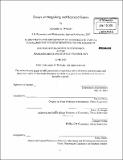Essays on bargaining and repeated games
Author(s)
Wolitzky, Alexander
DownloadFull printable version (12.39Mb)
Other Contributors
Massachusetts Institute of Technology. Dept. of Economics.
Advisor
Glenn Ellison, Daron Acemoglu and Muhamet Yildiz.
Terms of use
Metadata
Show full item recordAbstract
The thesis consists of four essays on bargaining and repeated games. The first essay studies whether allowing players to sign binding contracts governing future play leads to reputation effects in repeated games with long-run players. Given any prior over behavioral types, a modified prior is constructed with the same total weight on behavioral types and a larger support under which almost all efficient, feasible, and individually rational payoffs are attainable in perfect Bayesian equilibrium. Thus, whether reputation effects emerge in repeated games with contracts depends on details of the prior distribution over behavioral types other than its support. The second essay studies reputational bargaining under the assumption of first-order knowledge of rationality. The share of the surplus that a player can guarantee herself is determined, as is the bargaining posture that she must announce in order to guarantee herself this much. It is shown that this maxmin share of the surplus is large relative to the player's initial reputation, and that the corresponding bargaining posture simply demands this share plus compensation for any delay in reaching agreement. The third essay studies the maximum level of cooperation that can be sustained in sequential equilibrium in repeated games with network monitoring. The foundational result is that the maximum level of cooperation can be sustained in grim trigger strategies. Comparative statics on the maximum level of cooperation are shown to be highly tractable. For the case of fixed monitoring networks, a new notion of network centrality is introduced, which characterizes which players have greater capacities for cooperation and which networks can support more cooperation. The fourth essay studies the price-setting problem of a monopoly that in each time period has the option of failing to deliver its good after receiving payment. Optimal equilibrium pricing and profits are characterized. For durable goods, a lower bound on optimal profit for any discount factor is provided. The bound converges to the optimal static monopoly profit as the discount factor converges to one, in contrast to the Coase conjecture.
Description
Thesis (Ph. D.)--Massachusetts Institute of Technology, Dept. of Economics, 2011. Cataloged from PDF version of thesis. Includes bibliographical references (p. 194-202).
Date issued
2011Department
Massachusetts Institute of Technology. Department of EconomicsPublisher
Massachusetts Institute of Technology
Keywords
Economics.